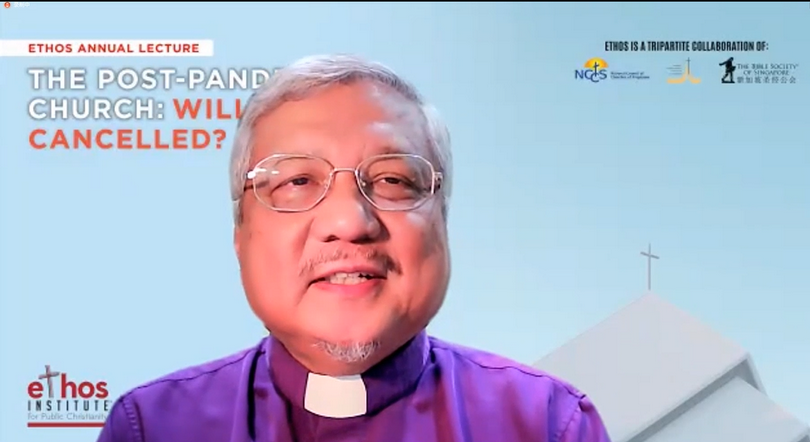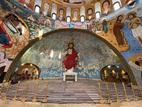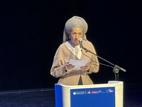Singaporean Bishop Emeritus Dr. Robert Solomon said that the church would never be canceled when the COVID-19 pandemic is over amid the modern phenomenon of “cancel culture”.
Bishop Emeritus Dr. Robert Solomon who has served as a medical doctor, church pastor, principal of Trinity Theological College, and the president of the National Council of Churches of Singapore, gave a virtual speech entitled “The Post-Pandemic Church: Will It be Canceled?” in the annual lecture held by the Ethos Institute for Public Theology on October 28.
Formed by the National Council of Churches of Singapore, Trinity Theological College and The Bible Society of Singapore in 2014, Ethos Institute for Public Christianity “serves to serve church and society by engaging contemporary issues and trends from the Christian perspective”, according to its official website.
Starting with the question of “can we Zoom forever?”, Bishop Dr Solomon said that during the COVID-19 pandemic, the church had a more visible presence on YouTube and Zoom, which he called as “online avatars of the church”.
As churches had moved to online platforms during the nearly-two-year-long pandemic, the number of returnees was below what was expected after churches reopened again and some churches converted to “a significant online format”.
The unpromising scenarios led to ongoing fears among some pastors and leaders that the churches in the past might be diminished after the coronavirus pandemic is over.
What was worse, the “cancel culture” that is defined as “a collective attempt at ruining the reputation and livelihood of an individual or organization in response to a problematic or harmful action or opinion” exacerbated the worries.
“One recent example (of canceling the church) is British author Philip Pullman. He’s an award-winning author and he’s famous for his trilogy Dark Materials. Some of these have been made into popular movies. In his books, he portrays God as an irrelevant, and spent old man, and the church as the most corrupt organization in human history. So, he ends his trilogy by mentioning that human beings can now build what he calls the Republic of the Heaven… basically challenging the Christian phrase the Kingdom of God,” he added.
In 1998, Pullman condemned C.S. Lewis’ Narnia books as “propaganda in the service of a life-hating ideology” in an article in the Guardian newspaper. The writer attempted to cancel the church by trying to paint the ugliest picture of it that he possibly could.
Bishop Solomon continued, “In our present socially ideological environment, there is a celebration of individualism (I don’t need the church), consumerism (what can I get from the church?), and a general anti-institutional attitude (I want spirituality but not religion). These are becoming dominant attitudes in modern society, especially among the younger people.”
“So, the theology of the church is necessary and important,” he added.
Jesus addressed the doctrine of the church by declaring the arrival of the kingdom of God and by pronouncing to build his church on Peter who confessed that he was the Messiah and Son of God.
“I don’t think the church can be canceled unless people cancel Christ. And Christ cannot be canceled for two thousand years,” the bishop announced.
According to the Book of Revelation, seven lampstands represent seven churches. The apostle Peter describes the church as a “spiritual house” of “living stones”, a “holy priesthood”, and “royal priesthood”.
Pauline teachings on the church stressed that the church is both a spiritual and social reality. As Christ is the Head over everything, the church is “his body” and “God’s household” based on Christ as the “chief cornerstone”. The relationship between Christ and his church is depicted in marital terms: the bridegroom and the bride. “This relationship is a profound mystery”.
Before tackling the critics of the church, the speaker listed out one of the blessings from the church that “it is the depository of Christian faith” where the biblical canons and the central tenets of Christian doctrines were determined and the true tradition of the interpretation of the Scripture was preserved.
It served as a continuing community of worship, had historical biographies of “saints”, and continued to spread the gospel.
“From the beginning, the church has been criticized from outside as well as from within. It was accused of various things (which) are not true.”
The negative sentiments towards the church included divisions such as the Great Schism in 1054, being “too institutionalized” like bureaucracy and over-organization, and hypocrisy with regards to nominalism, worldliness, and self-centeredness.
In response to such attacks, “apologists like John Lennox have shown that atheism has caused ever more damage in human history”.
“Second, some historians have written to show the great blessing the church has been to the world. A third response is like the recent book by an Australian academic and pastor John Dickson. The title of the book is called Bullies and Saints, which attempts to provide an honest look at the good and evil in the Christian history.”
The fourth criticism against the church claimed that it was irrelevant to modern sentiments. In their book The Spiritual Revolution: Why Religion is Giving Way to Spirituality, British academics Paul Heelas and Linda Woodhead state, “That there are signs that they (established religions in the West) are being replaced by less organized forms of spiritualities that embrace practices that are said to enhance the individual’s sense of identity and wellbeing.”
“In their view, secularization and re-sacralization are both taking place.”
“There is a wide growing sense in western societies that Christianity has outlived its usefulness and relevance... Nouwen, facing his own burnout and reasons for it, wrote ‘the Christian leader of the future is called to be completely irrelevant and to stand in this world with nothing to offer but his or her own vulnerable self. That is the way Jesus came to reveal God’s love.’”
He summarized, “The two primary metaphors in the New Testament for the church is that it is the Bride and the Body. This is the church’s identity and calling. The bride will be presented (in a way) that this bride and body signify the church’s identity as well as its location or its calling. So, the church as the bride will be presented by the Father to the Son as his pure bride. And God will ensure this, though we have many problems with the church.. The church is also the active body of Christ, connected to its head, the Lord Jesus Christ. The church as the bride continues to show the character of Christ, and as his body, it continues his ministry in our needy world.”
“What happens when its beauty is marred? What happens if the church becomes a paralyzed body or one which twitches out of habit but has stopped continuing the ministry of Christ? These are questions we have to ask ourselves as we think of the future of the church and how we ought to open ourselves to the ministry of Christ... So, we can thank God that God has not given up on the church, and what He began, He will complete. Being confident of this, that He who began a good work in you, which is actually in a Greek plural will carry it on to completion until the day of Christ,” Bishop Emeritus Solomon concluded.












